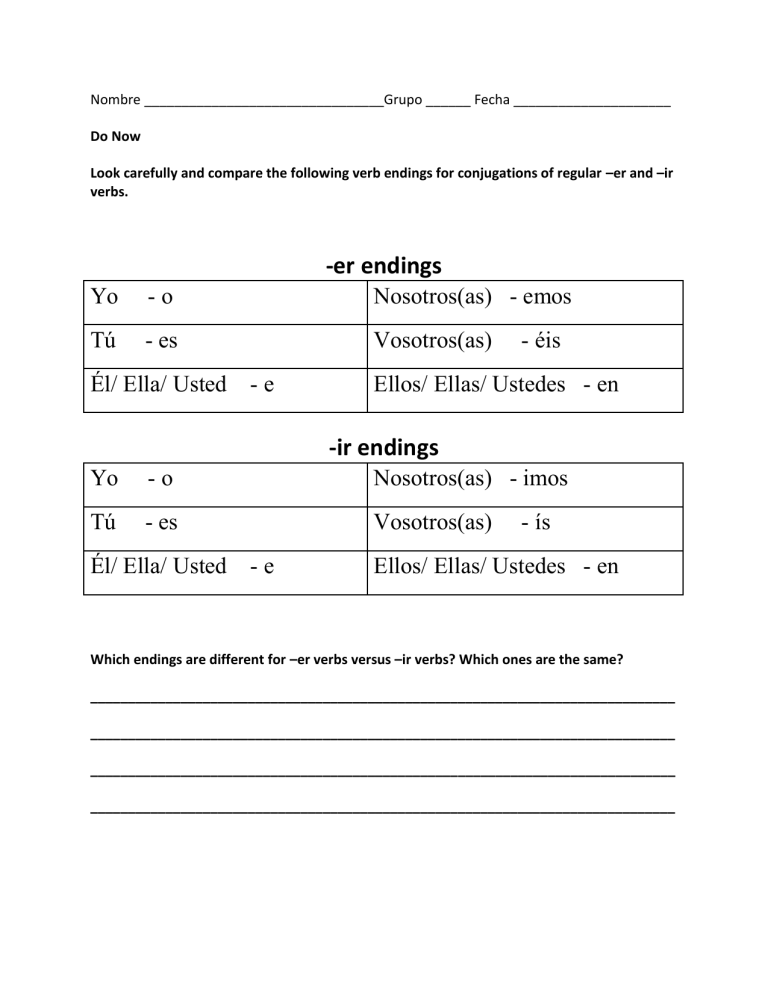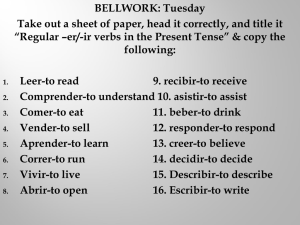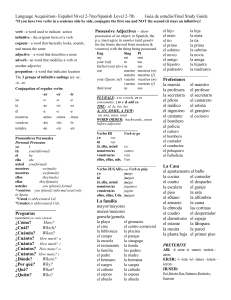
Nombre ________________________________Grupo ______ Fecha _____________________ Do Now Look carefully and compare the following verb endings for conjugations of regular –er and –ir verbs. -er endings Yo -o Nosotros(as) - emos Tú - es Vosotros(as) Él/ Ella/ Usted - e - éis Ellos/ Ellas/ Ustedes - en -ir endings Yo -o Nosotros(as) - imos Tú - es Vosotros(as) Él/ Ella/ Usted - e - ís Ellos/ Ellas/ Ustedes - en Which endings are different for –er verbs versus –ir verbs? Which ones are the same? ______________________________________________________________________________ ______________________________________________________________________________ ______________________________________________________________________________ ______________________________________________________________________________ -Er and –Ir Verbs Regular –er and –ir verb conjugations are very similar with the exception of the nosotros and vosotros form. Just like with –ar verbs, follow these steps to conjugate the verb correctly. STEP 1. Cross off the infinitive verb ending. Escribir STEP 2. Rewrite the stem. Escrib STEP 3. Add the correct ending for the subject. Tú escribes Common Regular –er Verbs Aprender – to learn Romper – to break Leer – to read Beber – to drink Vender – to sell Toser – to cough Comer – to eat Comprender – To understand Correr - to run Sorprender – to surprise Common Regular –ir Verbs Insistir – to insist Escribir – to write Subir – to go up Asistir – to attend (classes) Permitir – to permit/ allow Existir – to exist Definir – to define Recibir – To receive Describir - to describe Vivir– to live Complete the charts for the verb indicated. Be careful to note if it is an –er or an –ir verb. Escribir (to write) Yo _____________ Nosotros(as) ____________ Tú ____________ Vosotros(as) _____________ Él/ Ella/ Usted ___________ Ellos/ Ellas/ Ustedes _____________________ Beber (to drink) Yo _____________ Nosotros(as) ____________ Tú ____________ Vosotros(as) _____________ Él/ Ella/ Usted ___________ Ellos/ Ellas/ Ustedes _____________________ Dividir (to divide) Yo _____________ Nosotros(as) ____________ Tú ____________ Vosotros(as) _____________ Él/ Ella/ Usted ___________ Ellos/ Ellas/ Ustedes _____________________ A. Complete the following verbs in the present indicative. B. Complete the sentences with the correct form of the verb in parenthesis. 1. Los alumnos ____________________ composiciones. (escribir) 2. Nosotros ____________________ café. (beber) 3. Tú no ____________________ la verdad [truth]. (admitir) 4. Yo ____________________ todas las mañanas. (correr) 5. ¿Tú ____________________ en Madrid? (vivir) 6. Yo ____________________ mucho del profesor. (aprender) 7. Marcos y Juan ____________________ la tarea. (leer) 8. Pablo y yo no ____________________ la lección. (comprender) 9. Ellos ____________________ frutas y vegetales en el mercado. (vender) 10. Mis hermanos y yo ____________________ a la misma escuela. (asistir) 11. Ana _______________________en ir al cine. (insistir) C. Answer the following questions in complete sentences in Spanish. 1. ¿Dónde viven Uds.? ___________________________________________________________ 2. ¿Ven Uds. la televisión? ________________________________________________________ 3. ¿Estudian Uds. geometría? _____________________________________________________ Complete the sentences with the correct form of the verb in the present indicative. Foto de Kimberly Mukerjee aprender to learn asistir to attend beber to drink comer to eat comprender to understand escribir to write hacer (irreg.) to do, to make imprimir to print leer to read salir to leave ser to be vivir to live Hola. Me llamo Margarita Vallejo y yo _______________(asistir) a la Universidad Politécnica en Quito, Ecuador. Yo ________________(vivir) en una residencia estudiantil con dos amigas que _____________(ser) super simpáticas. Ellas se llaman Patricia y Verónica. Durante la semana nosotras __________________(aprender) muchísimo en nuestras clases. Si yo no _________________(comprender) la tarea en una clase yo hago muchas preguntas. Todos mis profesores ______________(ser) pacientes y explican todo. Los sábados yo salgo de la residencia con mis amigas para Papaya.net un café internet muy popular. Yo necesito usar una computadora allí porque no hay una en la residencia. Primero yo ____________ (leer) un periódico online y _________________ (escribir) mi correo electrónico. Verónica ______________ (imprimir) su tarea para la clase de física y hace dos copias. A Patricia le gustan mucho las computadoras y hoy ella _____________(aprender) a usar el nuevo iMac en el café. Nosotras no ______________ (salir) del café ahora porque la comida de Papaya.net es fantástica. Primero nosotras _________(leer) el menú y después ____________(comer) empanadas. ¿Y para beber? ¡Naturalmente nosotras ______________(beber) jugo de papaya! Extension - Rules for Accentuation If a Word ends with N, S, or any vowel, the stress naturally falls on the second-to-last (penultimate) syllable. o Niña---- ni/ña If a word ends in any other consonant, the stress naturally falls on the last syllable. o Crucial --- cru/cial If there is a word that “violates” this rule, it needs an accent mark (tilde) to indicate where to place the stress in the word. In addition, accent marks (tildes) are sometimes used to differentiate monosyllabic words that are spelled the same but have different meanings. For example, “tu” means your but “tú” means you. Circle the stressed syllable. To/ma/te co/mer Car/cel (Jail) Gen/te (people) Po/e/ma fi/nal Ha/bla Tra/ba/jo Rewrite the word adding an accent mark if necessary. The syllable in bold is the stressed syllable. 1.triste (sad) = 2.importante (important) = 3. pobre (poor) = 4. miercoles (Wednesday) = 5. camisa (shirt) = 6. jovenes (young people) = 7. pagina (page) = 8. historia (history) = 9. trabajo (job) = 10. pajaro (bird) = 11. angel (angel) = 12. amor (love) =

